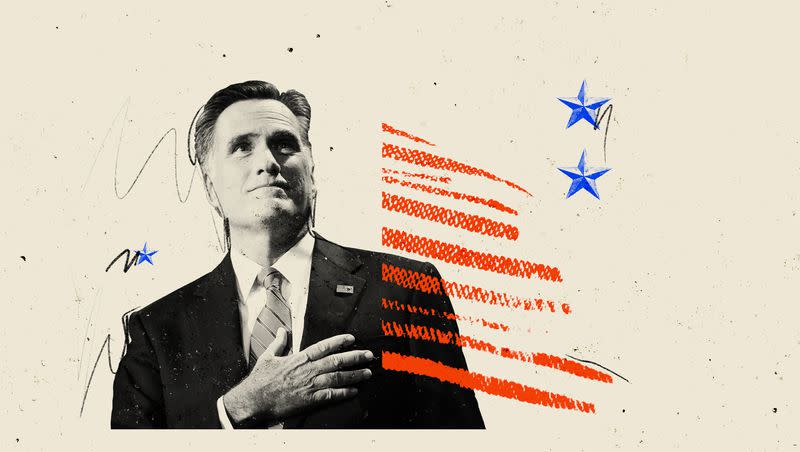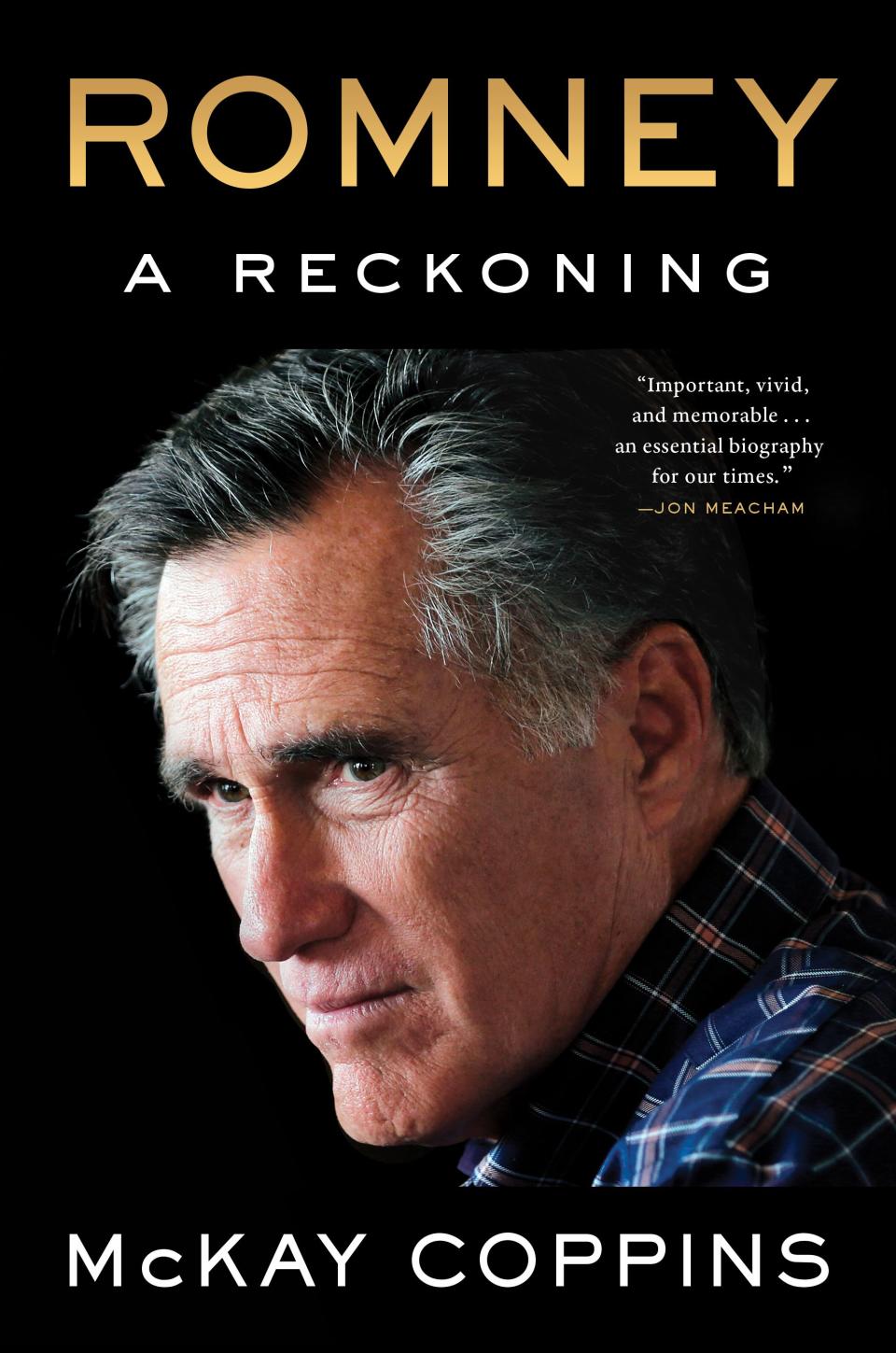7 big revelations from new biography on Sen. Mitt Romney

- Oops!Something went wrong.Please try again later.
- Oops!Something went wrong.Please try again later.
- Oops!Something went wrong.Please try again later.
- Oops!Something went wrong.Please try again later.
- Oops!Something went wrong.Please try again later.
- Oops!Something went wrong.Please try again later.
Sen. Mitt Romney, a prominent fixture of American politics, has had a decadeslong political career filled with accomplishments, intrigue, deep personal convictions and some controversy. The latest biography, “Romney: A Reckoning” peels back the curtain on the Republican senator’s career.
The pages dive into his time with former President Donald Trump, who reportedly offered Romney an ambassadorship to Russia, and detail his complex relations with Utah’s Sen. Mike Lee and former Sen. Orrin Hatch.
“Romney: A Reckoning,” written by The Atlantic’s McKay Coppins, also highlights the impact of the senator’s presidential run on The Church of Jesus Christ of Latter-day Saints, and sheds light on the concerns some evangelical leaders had about Romney’s Latter-day Saint faith.

It’s already been reported that the book details Oprah calling Romney to explore a potential presidential bid in 2020. Here are seven additional big revelations from the book, which is set to be released on Oct. 24, 2023.
Romney’s relationship with Trump goes back decades, and Romney once wrote in 2012 he was “the real deal.”
The book reveals that although Romney was reticent about former President Trump dating back to the mid-1990s, during the 2012 presidential campaign Romney actually came to enjoy Trump’s company, even though the two would eventually become bitter political adversaries in the years that followed.
In 1995, while Romney worked at Bain Capital, an investment firm, he spent several days at Trump’s Mar-a-Lago mansion in Florida. The experience was “deeply weird,” beginning with Romney’s arrival: upon reaching the complex in a limousine, Romney and Trump were greeted by dozens of members of Trump’s service staff, all in white linen uniforms, who greeted their boss “as if posed for a royal reception.”
Related
Years later, Romney and Trump ran into each other at a New England Patriots football game, where both were guests in owner Bob Kraft’s suite. While there, Trump bragged to Romney’s son, Josh, about his then-new girlfriend, Melania. “When I drop her, the phone is gonna ring off the hook. Every guy in New York wants to go out with her,” Trump said.
During his 2012 campaign, however, Romney accepted an endorsement from Trump. In his personal journal, Romney admitted that he came to like Trump’s funny, outrageous personality: “This guy is not fake — he says 100% of what he thinks. No veneer, the real deal. Got to love him. Makes me laugh and makes me feel good, both. They just don’t make people like Donald Trump very often.”
Sen. Mike Lee and Sen. Mitt Romney don’t always get along
Romney “couldn’t bring himself” to endorse Sen. Mike Lee in his 2022 election against independent Evan McMullin, Coppins writes. Prior to the election, Romney and Lee were “little more than cordial,” according to Coppins, in large part because of Lee’s objections to bills introduced by Romney. Then Lee went on Fox News and publicly asked for Romney’s endorsement and for his family to donate to his campaign.
Writes Coppins:
“When people in their overlapping circles would bring it up with Romney, he’d pointedly remind them that his colleague, a supposedly strict constitutionalist, had spent months trying to help a president remain in power despite losing his election. Perhaps, Romney speculated, Lee had foolishly convinced himself that his fealty would be rewarded by Trump with an appointment to the Supreme Court.”
Lee’s push to publicly seek Romney’s endorsement “did lasting damage to their relationship,” Coppins writes.
“And in ungenerous moments, Romney wondered aloud if his colleague had simply acted out of resentment,” Coppins continues. “… ‘Maybe,’ Romney mused to one confidant, ‘he just can’t stand being in my shadow.’”
Orrin Hatch asked Romney to replace him … then changed his mind
In March 2017, Sen. Hatch of Utah asked Romney to run for his seat in the U.S. Senate. Hatch, who had served in that capacity for four decades, “wanted to make sure his seat would be in good hands before he made the decision” to retire, Coppins writes.
But in subsequent months, Trump reportedly encouraged Hatch to run for reelection, causing Hatch to consider retaining his seat. Further, Hatch believed his legacy deserved more respect.
Eventually, Hatch decided to retire — aided by Romney’s longtime fundraiser, Spencer Zwick, who “offered to help raise funds to establish an institute in Hatch’s name,” Coppins writes.
Trump offered Romney an ambassadorship to Russia
After Romney was considered to be Trump’s first secretary of state, Trump offered Romney the position of ambassador to Russia as “a consolation prize,” Coppins writes. Romney declined. The position was later offered to former Utah Gov. Jon Huntsman Jr.
The Huntsman-Romney relationship goes back decades, and the book shines new light on the onetime political rivals. When Romney was tapped to lead the 2002 Winter Olympics in Salt Lake City, Jon Huntsman Sr. was a vocal critic of the out-of-stater, calling Romney and the other Olympic leaders “cronies.” Romney hosted a private meeting with Huntsman Sr., in which Huntsman’s “hostility was palpable,” Coppins writes.
“Do you think you’re the savior of Utah?” Huntsman reportedly said. “Who do you think you are?”
Coppins writes Huntsman had “been lobbying to install his son Jon Jr. as CEO, and he resented the way Utah’s business and political elite had lined up to coronate Romney instead.”
However, Huntsman Sr. later served on Romney’s finance committee for his 2008 presidential campaign.
But later in that election cycle, Huntsman Jr. — who then was governor of Utah — endorsed former Arizona Sen. John McCain. Romney called Huntsman Jr. and said, “Your grandfather is rolling over in his grave,” Coppins writes. (Romney and Huntsman are distant cousins, both direct descendants of early Latter-day Saint leader Parley P. Pratt.)
Before deciding to run for the U.S. Senate, Romney visited Huntsman Sr., who Romney had heard was “privately pushing for his son to run for the seat.”
“If Jon Jr. wants to be senator, he can have it,” Romney reportedly told Huntsman Sr.
Romney’s relationships with church leaders
Several of Romney’s interactions with leaders from The Church of Jesus Christ of Latter-day Saints are recounted in the book.
Days before the 2002 Winter Olympics’ opening ceremonies, Romney led a small group of church leaders through Rice-Eccles Stadium on a tour. As they concluded, then-President Gordon B. Hinckley asked, “What would be the ideal weather for the opening ceremonies?”
“Crispy cold, with just a hint of snow,” Romney replied.
Hinckley — remembered for his quick wit — didn’t miss a beat. “I’ll take care of it,” he said.
Shortly after Romney’s loss in 2012, Romney also met with then-President Boyd K. Packer of the Quorum of the Twelve Apostles. President Packer offered Romney a blessing suggesting this was not the end of Romney’s political career. The experience is detailed in a Deseret Magazine excerpt from the book.
Around the same time, after the campaign had ended, Romney met with several top leaders of the church, in which they were shown a presentation that outlines a sharp uptick in referrals to missionaries during Romney’s campaign.
Writes Coppins: “One apostle said that Ann had redefined the public perception of what it means to be a modern Mormon woman. Another told Romney that his campaign had helped bring the Church out of obscurity.”
In August 2020, Romney was invited to visit with the First Presidency and the Quorum of the Twelve Apostles about the upcoming election. Romney reportedly told them, “The way I look at this choice is that you can choose an awful person or awful policies. It’s one or the other. And your choice will depend on which you consider more important.”
Romney’s faith was a serious concern for evangelicals
During both of Romney’s presidential campaigns, Romney’s membership in The Church of Jesus Christ of Latter-day Saints was a dealbreaker for many evangelical Christians. But Coppins’ book shows how serious a concern this was for many.
In one meeting with evangelical leaders in South Carolina during his 2008 campaign, Romney was told that if he was “elected president, more people will go to Hell.” The pastor continued: “More people will think being Mormon is normal, more people will become Mormon, and more people will go to Hell.”
On a separate occasion during his 2008 run, Romney invited Franklin Graham, Jerry Falwell and several other pastors to his home in Massachusetts. Graham asserted that Romney couldn’t call himself a Christian because of “Mormons’ rejection of the Trinity” and told Romney he could not support him because Romney “named two people who were gay to the court in Massachusetts.”
Romney developed a cordial relationship with Biden
Romney’s biography reveals that amid partisan tension on Capitol Hill, the Utah Republican senator formed a surprising friendship with President Joe Biden.
The two came to know each other on a first-name basis after Romney took a lonely stand as one of only three Republican senators to vote to confirm Ketanji Brown Jackson, Biden’s nominee for the Supreme Court.
They would talk over the phone, topics of discussion ranging from political business to the difficulties of aging before the public spotlight. On one occasion, Biden called Romney while he was at church, telling him, “I just wanted to call and tell you that I admire your character.” On another occasion, Romney even gave the president advice on how to look younger when he walked, Coppins reports.
In the months following Jackson’s confirmation, Biden arranged for a guided tour of the White House for Romney’s son’s family. During the tour, the Romneys crossed paths with the president, first lady and their dog. Biden proceeded to take over for the tour guide, showing the family around the West Wing. When one of Romney’s grandchildren was asked of his impression of the president, the child said, “I thought he would be less old.”

